| |||||
| Decades: | |||||
|---|---|---|---|---|---|
| See also: | Other events of 2023 History of Bolivia • Years | ||||
The following is a chronology of notable events from the year 2023 in Bolivia.
| |||||
| Decades: | |||||
|---|---|---|---|---|---|
| See also: | Other events of 2023 History of Bolivia • Years | ||||
The following is a chronology of notable events from the year 2023 in Bolivia.



Luis Alberto Arce Catacora, often referred to as Lucho, is a Bolivian banker, economist, and politician serving as the 67th president of Bolivia since 2020. A member of the Movement for Socialism, he previously served as minister of finance—later minister of economy and public finance—from 2006 to 2017, and in 2019.
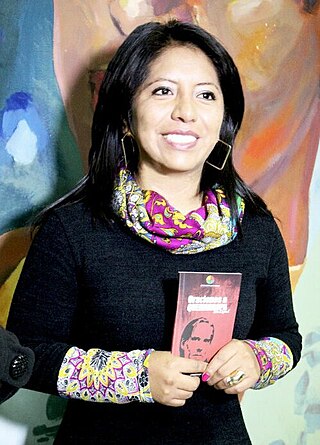
Nadia Alejandra Cruz Tarifa is a Bolivian lawyer and politician serving as vice minister of equal opportunities since 2022. Cruz developed her career practicing law in La Paz and El Alto, during which time she became an active member and advisor to various human rights NGOs. Starting in the 2010s, Cruz began serving as a public official in the Ombudsman's Office, where she exercised a multitude of minor functions before being appointed deputy ombudsman for the defense of and compliance with human rights. Following the intra-term resignation of David Tezanos Pinto in 2019, Cruz was among three deputy ombudsmen in the line of succession and was considered the only viable candidate to assume the position.

Adriana Salvatierra Arriaza is a Bolivian political scientist and politician who served as president of the Senate in 2019. A member of the Movement for Socialism, she served as senator for Santa Cruz from 2015 to 2020 and was a substitute senator for Santa Cruz under Carlos Romero in 2015. At age twenty-nine, Salvatierra was the youngest legislator and third woman to hold the presidency of the Senate and was the youngest individual to ever exert presidential authority, albeit briefly in an acting capacity.

Jeanine Áñez Chávez is a Bolivian lawyer, politician, and television presenter who served as the 66th president of Bolivia from 2019 to 2020. A former member of the Social Democratic Movement, she previously served two terms as senator for Beni from 2015 to 2019 on behalf of the Democratic Unity coalition and from 2010 to 2014 on behalf of the National Convergence alliance. During this time, she served as second vice president of the Senate from 2015 to 2016 and in 2019 and, briefly, was president of the Senate, also in 2019. Before that, she served as a uninominal member of the Constituent Assembly from Beni, representing circumscription 61 from 2006 to 2007 on behalf of the Social Democratic Power alliance.
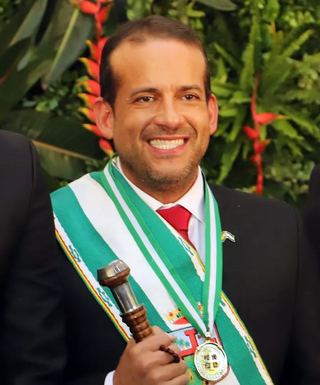
Luis Fernando Camacho Vaca is a Bolivian activist, businessman, lawyer, and politician serving as the 2nd governor of Santa Cruz since 2021. He is the leader of Creemos, opposition bench in the Plurinational Legislative Assembly and was the chair of the Santa Cruz Civic Committee in 2019.

Andrónico Rodríguez Ledezma is a Bolivian cocalero activist, political scientist, politician, and trade unionist serving as president of the Senate since 2020. A member of the Movement for Socialism, he serves as senator for Cochabamba. Rodríguez's lengthy career in the cocalero union hierarchy saw him serve as general secretary of the 21 September Workers' Center from 2015 to 2016 and as executive of the Mamoré Bulo Bulo Federation from 2016 to 2018, in addition to a multitude of other minor positions. He has served as vice president of the Coordination Committee of the Six Federations of the Tropic of Cochabamba since 2018 and held office as president of the organization from 2019 to 2020 in the absence of the body's longtime leader, Evo Morales.

Arturo Carlos Murillo Prijic is a Bolivian businessman, hotelier, and politician who served as the minister of government from 2019 to 2020. As a member of the National Unity Front, he previously served as a senator for Cochabamba from 2015 to 2019 and as a plurinominal member of the Chamber of Deputies from Cochabamba from 2006 to 2010.

Oscar Miguel Ortiz Antelo is a Bolivian businessman and politician who served as minister of economy and public finance from July to September 2020 and as minister of productive development from May to July 2020. As a member of the Social Democratic Movement, he previously served two terms as a senator for Santa Cruz from 2015 to 2020 on behalf of the Democratic Unity coalition and from 2006 to 2010 on behalf of the Social Democratic Power alliance. Nearing the end of his second term, Ortiz was his party's presidential candidate, attaining fourth place in the annulled 2019 general elections. During his first term, he served as president of the Senate from 2008 to 2010, the last opposition legislator to preside over the upper chamber as of 2024. Outside of national politics, Ortiz served as president of the Union of Latin American Parties from 2018 to 2021 and has been the rector of the Bolivian Catholic University at Santa Cruz since 2021.

Yerko Martín Núñez Negrette is a Bolivian agronomist and politician who served as minister of the presidency from 2019 to 2020. A member of the Social Democratic Movement, he previously served as minister of public works from November to December 2019. Throughout his ministerial tenure, Núñez was noted as a key person of influence in the transitional government and a "right-hand" to President Jeanine Áñez, a fellow Beni native. Prior to his appointment, he served as senator from Beni from 2015 to 2019 on behalf of the Democratic Unity coalition. As a member of Beni First, Núñez served as mayor of Rurrenabaque from 2010 to 2014; he previously held the position for two terms from 2000 to 2003 and 2005 to 2010 as part of the Revolutionary Nationalist Movement. Núñez's mayoral tenure saw strides made for Rurrenabaque's ecotourism industry, which generated increased economic growth for the city.
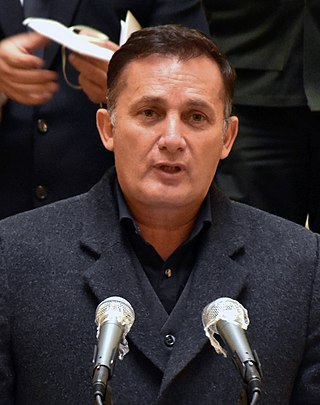
Luis Fernando López Julio is a Bolivian businessman, retired military officer, and politician who served as minister of defense from 2019 to 2020. Appointed in the tail end of the 2019 political crisis, López, along with Minister of Government Arturo Murillo, quickly became characterized as the "strong men" of the Jeanine Áñez administration and were implicated in the deadly events at Senkata and Sacaba. López was called to hearings by the Plurinational Legislative Assembly but failed to present himself three consecutive times, ultimately resulting in his censure by the legislature. As per the terms of the Constitution, he was dismissed as minister but, exploiting a loophole in the document's text, he was reappointed just a day later. Soon after, reports revealed his participation in the tear gas case, which accused the ministries of government and defense of irregularly purchasing non-lethal weapons at inflated prices.

The Arce Cabinet constitutes the 222nd cabinet of the Plurinational State of Bolivia. It was formed on 9 November 2020, one day after Luis Arce was sworn in as the 67th president of Bolivia following the 2020 general election, succeeding the Áñez Cabinet. The cabinet is composed entirely of members of the ruling Movement for Socialism. Described as a "technocratic" cabinet, it has been noted for the low-profile and youth of some of its members as well as its political distance from former president Evo Morales.
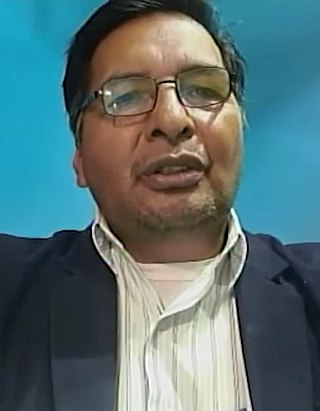
Adrián Rubén Quelca Tarqui is a Bolivian politician, professor, and trade unionist who served as minister of education from 2020 to 2021. A member of the Communist Party, Quelca worked to implement a project for a "semi-present" school system in which partial in-person learning would be coupled with radio and tele-education. Under his management, schools previously closed early by the past administration were reopened to blended learning for the 2021 year. Despite initial hopes for fully in-person classes by the second half of the year, results never panned out, and his administration was hampered by an ongoing corruption investigation that ultimately culminated in the presentation of charges and his resignation on 12 November 2021.
Events from the year 2022 in Bolivia.
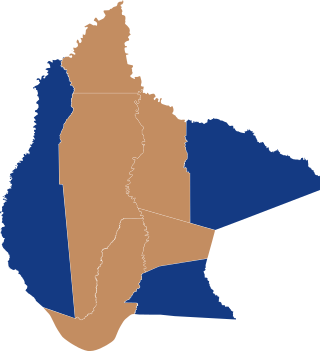
The 2021 Beni gubernatorial election was held on Sunday, 7 March 2021, to elect the governor of Beni, Bolivia. Alex Ferrier, the incumbent governor after the 2015 gubernatorial election but who resigned during the 2019 political crisis, ran to return to office for a second term. He was defeated by Alejandro Unzueta, who received a popular vote plurality of 41.79 percent—a margin of more than forty percent plus ten percent above the next closes competitor—allowing for a first-round victory without the need for a runoff.
The governor of Santa Cruz is the head of government of the Bolivian department of Santa Cruz. Established by the 2009 Constitution of Bolivia, the office of governor superseded the office of prefect, which was historically appointed by the president of Bolivia but in 2005 was made subject to popular will by election. The governor is eligible to be elected to two five-year terms, but must resign from office six months in advance of an election if they wish to be consecutively reelected.

Edgar Pary Chambi is a Bolivian politician and university professor serving as minister of education since 2021. A member of the Movement for Socialism, he previously served as the general director of higher education, technological, linguistic, and artistic techniques within the Ministry of Education and was the department director of education in Potosí from 2011 to 2012.
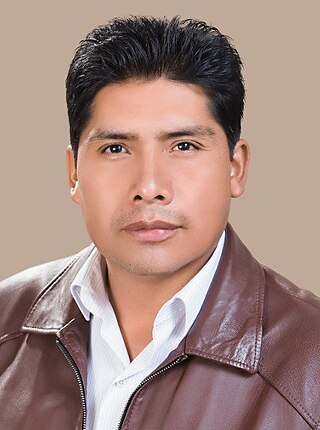
Franklin Richar Flores Córdova is a Bolivian politician, trade unionist, and former student leader serving as general manager of the Food Production Support Enterprise since 2021. A member of the Movement for Socialism, he previously served as a member of the Chamber of Deputies from La Paz, representing circumscription 18 from 2015 to 2020. Before that, he served as a Sica Sica municipal councillor from 2010 to 2014, during which time he held office as the body's president. In 2021, Flores was his party's candidate for governor of La Paz, placing second in that year's gubernatorial election.

Freddy Mamani Laura is a Bolivian educator, politician, and trade unionist who served as president of the Chamber of Deputies from 2020 to 2022. A member of the Movement for Socialism, he has served as a party-list member of the Chamber of Deputies from La Paz since 2020. He previously served as executive secretary of the National Confederation of Rural Teachers of Bolivia and as departmental executive of the Federation of Rural Teachers of La Paz. Prior to entering politics, Mamani worked as a teacher, serving as the principal of various rural schools in the department.

Pedro Francisco Callisaya Aro is a Bolivian academic, constitutional lawyer, and jurist serving as the sixth ombudsman of Bolivia since 2022. Callisaya developed his career in academic circles, completing multiple graduate and postgraduate courses in the fields of constitutional law and human rights. After exercising a couple of minor public posts in the late 1990s, Callisaya entered the Ombudsman's Office, where he worked for over a decade. He served for two terms on the Departmental Court of Justice of La Paz from 2012 to 2016 and 2017 to 2021.